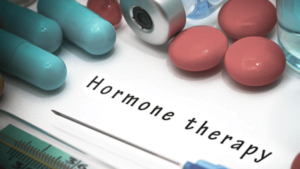Polycystic Ovary Syndrome (PCOS) is a common hormonal disorder affecting individuals assigned to females at birth. Characterized by irregular menstrual cycles, hormonal imbalances, and the presence of small cysts on the ovaries, PCOS can lead to a range of symptoms impacting reproductive, metabolic, and psychological health. In this comprehensive guide, we delve into the intricacies of PCOS therapy, exploring various treatment options and lifestyle interventions designed to manage and alleviate the symptoms associated with this condition.
Contents
How To Treat PCOS?

PCOS treatment involves a multifaceted approach.
- Medical interventions include oral contraceptives, anti-androgen medications, and insulin-sensitizing agents.
- Lifestyle modifications focus on a low-glycemic diet, regular exercise, and weight management.
- Alternative therapies like acupuncture and herbal supplements may complement conventional treatments. Psychosocial support, stress reduction, and mental health management are vital.
- Regular monitoring through hormonal panels and ultrasound exams, coupled with consistent healthcare provider engagement, ensures effective, personalized PCOS management.
A holistic approach addresses symptoms, regulates menstrual cycles, and improves overall well-being, emphasizing the need for ongoing collaboration between individuals and healthcare professionals.
Different Types of PCOS Therapy
PCOS therapy encompasses a range of approaches tailored to address specific symptoms and underlying hormonal imbalances. Here are the different types of PCOS therapy:
Hormonal Therapy

Hormonal therapy is a key component of PCOS (Polycystic Ovary Syndrome) treatment, aiming to address the hormonal imbalances that characterize the condition. Here’s an exploration of hormonal therapy as a crucial element in managing PCOS:
Oral Contraceptives (Birth Control Pills):
- Objective: Regulate menstrual cycles and reduce androgen levels.
- Mechanism: Combined oral contraceptives containing estrogen and progestin suppress ovarian androgen production, promoting regular menstrual cycles.
- Benefits: Reduces acne, and hirsutism, and regulates menstruation.
- Considerations: Not suitable for women trying to conceive; potential side effects should be discussed with a healthcare provider.
Anti-Androgen Medications:
- Objective: Target symptoms associated with elevated androgens (male hormones).
- Examples: Spironolactone is commonly used to counteract androgen effects, addressing issues like acne and excess hair growth.
- Considerations: Careful monitoring for potential side effects, especially if pregnancy is a consideration.
Insulin-Sensitizing Agents:
- Objective: Manage insulin resistance, a common feature in PCOS.
- Examples: Metformin is often prescribed to improve insulin sensitivity and regulate menstrual cycles.
- Benefits: Helps in addressing metabolic aspects of PCOS, promoting weight loss, and improving fertility in some cases.
- Considerations: Side effects and tolerability should be discussed with a healthcare professional.
Hormonal therapy plays a pivotal role in restoring hormonal balance, regulating menstrual cycles, and alleviating symptoms associated with PCOS.
Fertility Treatments
Fertility treatments are a crucial aspect of PCOS (Polycystic Ovary Syndrome) therapy for individuals who face challenges with ovulation and fertility. Here’s an overview of fertility treatments commonly used in the context of PCOS:
Ovulation-Inducing Medications:
- Objective: Stimulate the ovaries to release eggs for fertilization.
- Common Medications:
- Clomiphene Citrate: An oral medication that induces ovulation by stimulating the release of hormones necessary for follicle development.
- Letrozole: Another oral option that is sometimes preferred over clomiphene citrate, especially for individuals who do not respond well to the former.
In Vitro Fertilization (IVF):
- Objective: Assisted reproductive technology to facilitate conception.
- Procedure: In IVF, mature eggs are retrieved from the ovaries, fertilized with sperm in a laboratory setting, and the resulting embryos are then transferred to the uterus.
- Indications: Used when other fertility treatments are unsuccessful or inappropriate.
Intrauterine Insemination (IUI):
- Objective: Place sperm directly into the uterus around the time of ovulation to enhance the chances of fertilization.
- Indications: Often used in conjunction with ovulation-inducing medications.
Lifestyle and Dietary Modifications:
- Objective: Address factors that may impact fertility, such as obesity or insulin resistance.
- Benefits: Weight management, a balanced diet, and exercise can contribute to improved fertility outcomes.
Hormonal Support during Pregnancy:
- Objective: Maintain a healthy pregnancy in individuals with PCOS who successfully conceive.
- Progesterone Supplementation: Often prescribed to support the uterine lining during early pregnancy.
Alternative Therapies

Alternative therapies can be considered complementary approaches to conventional medical treatments for PCOS (Polycystic Ovary Syndrome). While research on their efficacy may vary, some individuals find relief from certain symptoms with these alternative methods. Here are several alternative therapies commonly explored in the context of PCOS therapy:
Acupuncture
- Objective: Derived from traditional Chinese medicine, acupuncture aims to restore balance in the body’s energy flow.
- Potential Benefits: Some studies suggest that acupuncture may help regulate menstrual cycles and reduce symptoms related to PCOS.
- Considerations: Seek a qualified and experienced acupuncture practitioner.
Herbal Supplements
- Vitex (Chasteberry): Thought to influence hormonal balance and regulate menstrual cycles.
- Spearmint Tea: Some research suggests it may help reduce hirsutism by lowering androgen levels.
- Cinnamon and Inositol: Investigated for their potential benefits in improving insulin sensitivity.
- Considerations: Consult with a healthcare professional before incorporating herbal supplements, as interactions and side effects can occur.
Mind-Body Techniques
- Yoga and Meditation: Stress reduction through mind-body practices can positively impact hormonal balance.
- Biofeedback and Relaxation Techniques: Managing stress may contribute to improved symptoms.
- Considerations: Incorporate stress-reducing techniques as part of an overall lifestyle approach to PCOS therapy.
Dietary Approaches
- Inositol Supplementation: Studies suggest that inositol, a B-vitamin-like compound, may improve insulin sensitivity.
- Omega-3 Fatty Acids: Found in fish oil, these may have anti-inflammatory effects.
- Considerations: Dietary changes should be discussed with a healthcare provider or nutritionist.
Aromatherapy
- Objective: Using essential oils to promote relaxation and emotional well-being.
- Potential Benefits: Some individuals find relief from symptoms like stress and anxiety.
- Considerations: Use cautiously and consult with a qualified aromatherapist; avoid allergic reactions.
Chiropractic Care
- Objective: Spinal adjustments to enhance overall well-being.
- Potential Benefits: Some individuals report improved menstrual regularity and reduced pain.
- Considerations: Consult with a chiropractor experienced in working with PCOS patients.
It’s essential to approach alternative therapies with an open mind, recognizing that their efficacy may vary from person to person. Importantly, these alternative approaches should complement rather than replace conventional medical treatments.
Emerging Therapies
Emerging therapies for PCOS (Polycystic Ovary Syndrome) are an exciting area of research, aiming to provide innovative and effective treatment options. While some are still in the experimental or early stages, they offer hope for enhanced management of PCOS. Here are some emerging therapies:
GnRH Antagonists:
- Objective: GnRH (Gonadotropin-Releasing Hormone) antagonists are being studied as an alternative to GnRH agonists, to achieve better ovarian stimulation in assisted reproduction techniques.
Selective Androgen Receptor Modulators (SARMs):
- Objective: SARMs are being explored for their potential to selectively target androgen receptors, addressing hyperandrogenism in PCOS without the side effects associated with anti-androgen medications.
Farnesoid X Receptor (FXR) Agonists:
- Objective: FXR agonists are investigated for their role in regulating bile acid metabolism and improving metabolic parameters, which are often disturbed in PCOS.
Myo-Inositol and D-Chiro-Inositol Combinations:
- Objective: Combining different forms of inositol, a compound related to the B-vitamin family, is being studied for its potential to improve insulin sensitivity and ovarian function.
Benefits of PCOS Therapy

PCOS (Polycystic Ovary Syndrome) therapy aims to address the symptoms and underlying hormonal imbalances associated with the condition. The benefits of PCOS therapy are multifaceted, encompassing improvements in reproductive health, metabolic function, and overall well-being. Here are some key benefits:
Regulated Menstrual Cycles:
- Objective: Many individuals with PCOS experience irregular or absent menstrual cycles.
- Benefits: PCOS therapy, particularly hormonal interventions, helps regulate menstrual cycles, promoting regularity and addressing associated symptoms.
Improved Fertility:
- Objective: PCOS is a common cause of infertility due to irregular ovulation.
- Benefits: Fertility treatments, such as ovulation-inducing medications or assisted reproductive technologies, can enhance the chances of conception in individuals with PCOS.
Management of Hyperandrogenism:
- Objective: Elevated androgen levels in PCOS contribute to symptoms like acne and hirsutism.
- Benefits: Anti-androgen medications and hormonal therapies help manage these symptoms, improving skin health and reducing excess hair growth.
Enhanced Insulin Sensitivity:
- Objective: Insulin resistance is common in PCOS and contributes to metabolic disturbances.
- Benefits: Insulin-sensitizing agents and lifestyle modifications improve insulin sensitivity, helping manage weight and reduce the risk of type 2 diabetes.
Weight Management:
- Objective: Many individuals with PCOS experience weight gain or have difficulty losing weight.
- Benefits: Lifestyle modifications, including dietary changes and regular exercise, contribute to weight management and may improve overall metabolic health.
Reduced Risk of Metabolic Syndrome:
- Objective: PCOS means the risk of metabolic syndrome.
- Benefits: Addressing insulin resistance and adopting a healthy lifestyle can reduce the risk of metabolic complications such as high blood pressure, dyslipidemia, and cardiovascular disease.
Which PCOS Therapy To Choose?
Choosing the right PCOS (Polycystic Ovary Syndrome) therapy depends on individual symptoms, health goals, and reproductive plans. Here are key points to consider when determining the most suitable PCOS therapy:
Consult with a Healthcare Professional:
- Seek guidance from a healthcare provider, preferably a gynecologist or endocrinologist, who specializes in reproductive health.
- A thorough evaluation of symptoms, medical history, and diagnostic tests is essential for personalized recommendations.
Identify Primary Concerns and Goals:
- Clarify whether the primary concern is irregular menstrual cycles, infertility, hirsutism, acne, or metabolic issues.
- Define reproductive goals, such as regulating cycles for conception or managing symptoms for improved quality of life.
Consideration of Reproductive Plans:
- Individuals planning to conceive may benefit from fertility treatments like ovulation-inducing medications or assisted reproductive technologies.
- Those not seeking pregnancy may focus on managing symptoms and preventing long-term metabolic complications.
Hormonal Therapy for Menstrual Regularity:
- Oral contraceptives can be effective in regulating menstrual cycles and managing symptoms like acne and hirsutism.
- Anti-androgen medications may be prescribed to address hyperandrogenism.
Fertility Treatments for Conception:
- Ovulation-inducing medications such as Clomiphene citrate or letrozole may be recommended.
- In vitro fertilization (IVF) may be considered for more complex fertility challenges.
Conclusion
In conclusion, navigating the complexities of PCOS therapy requires a personalized and multidimensional approach.
As individuals embark on their PCOS management journey, collaboration with healthcare professionals is paramount. As research advances and new therapies emerge, the landscape of PCOS management continues to evolve, offering hope for improved quality of life and reproductive success for individuals affected by this condition.
If you are facing PCOS-related issues, PCOS treatment at HerMantra can help. Book your free trial online Pcos treatment session now.


